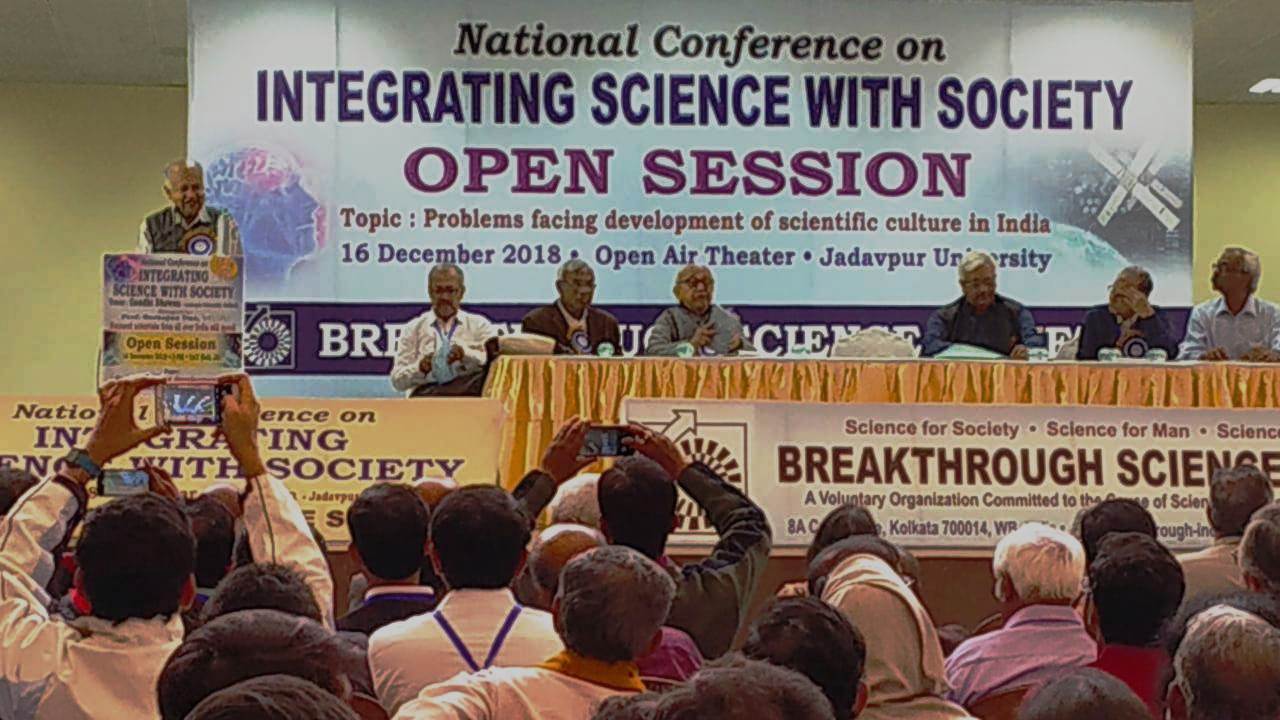The two day National Conference on ‘Integrating Science with Society’ was held at Jadavpur University, Kolkata on the 15th and 16th of December, 2018. The conference had sessions on the Philosophy of Science, Cultivation of Scientific Temper, Ethical Practice in Science, Reforming Science Education and a Panel Discussion on“The role of scientists in society”. The conference concluded with an Open Session (for the public) addressed by the eminent astrophysiist Prof Jayant Narlikar.
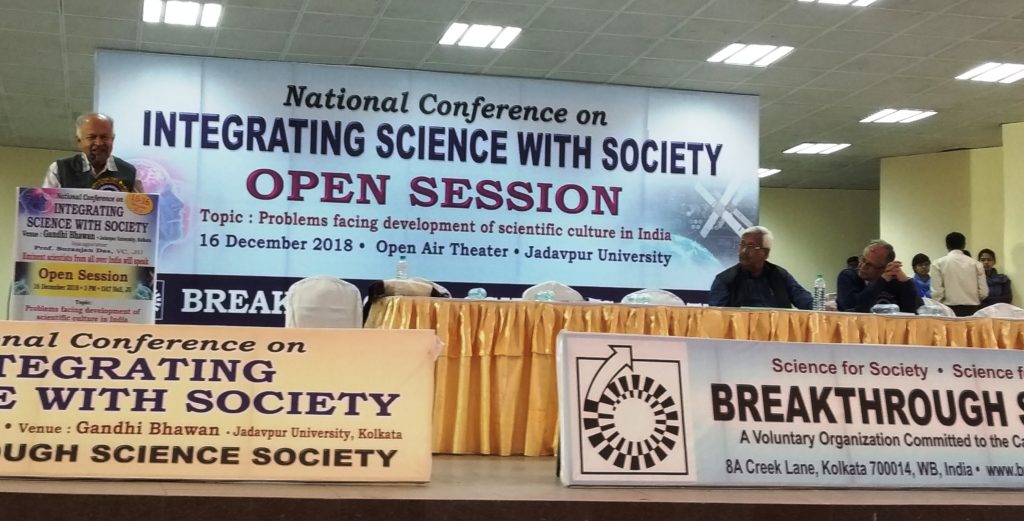
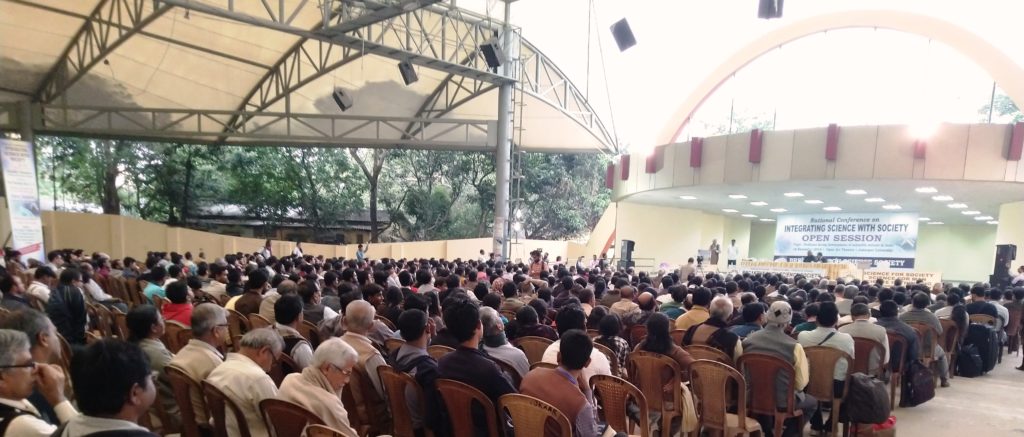
The conference was inaugurated by Prof.Suranjan Das, Vice Chancellor, Jadavpur University at Gandhi Bhavan, Jadavpur University, Kolkata,on Dec 15. Prof Soumitro Banerjee, General Secretary of Breakthrough Science Society welcomed the gathering and Prof Dhruba Mukhopadhyay, former Professor of Geology, Calcutta University and President, Breakthrough Science Society, presided. In his inaugural address Prof Das said that the Science movement led by Breakthrough Science Society is a timely step towards building scientific temperament in the society. He began with quotes from two leading scientists “Science begins where speculation ends” and “Science is nothing but the refinement of everyday thinking”. He then asked the question ‘After 70 years of independence have we been able to end speculations or superstitions?’ He lamented that his colleagues from the science stream were more superstitious than those from the social science background. He stressed that education based on scientific reason can help the country to come out of the present crisis.
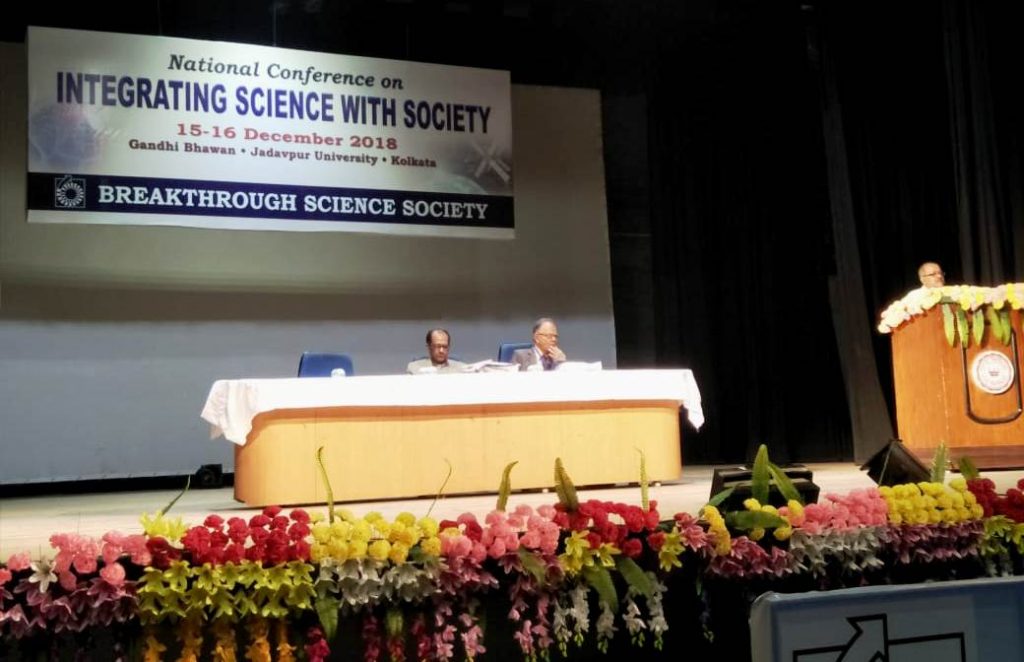
Session 1: History and Philosophy of Science
The session was chaired by Professor Dhruba Mukhopadhyay, President, Breakthrough Science Society
Prof S G Dani, former President, National Board of Higher Mathematics and Professor, Centre for Excellence in basic sciences, Mumbai
‘On issues of scientific validation in everyday life’
Over the last one century science has brought many benefits to society, but science is not just about benefits alone, it also provides a way of thinking. Prof Dane briefly outlined the development of knowledge and the method of science. Knowledge grows as a cumulative body through putting together experiences in a coherent form; forming hypotheses based on them; testing the hypotheses; identifying limitations of the hypotheses through multiple applications, modifying wherever appropriate etc. – This is the essence of the scientific method.
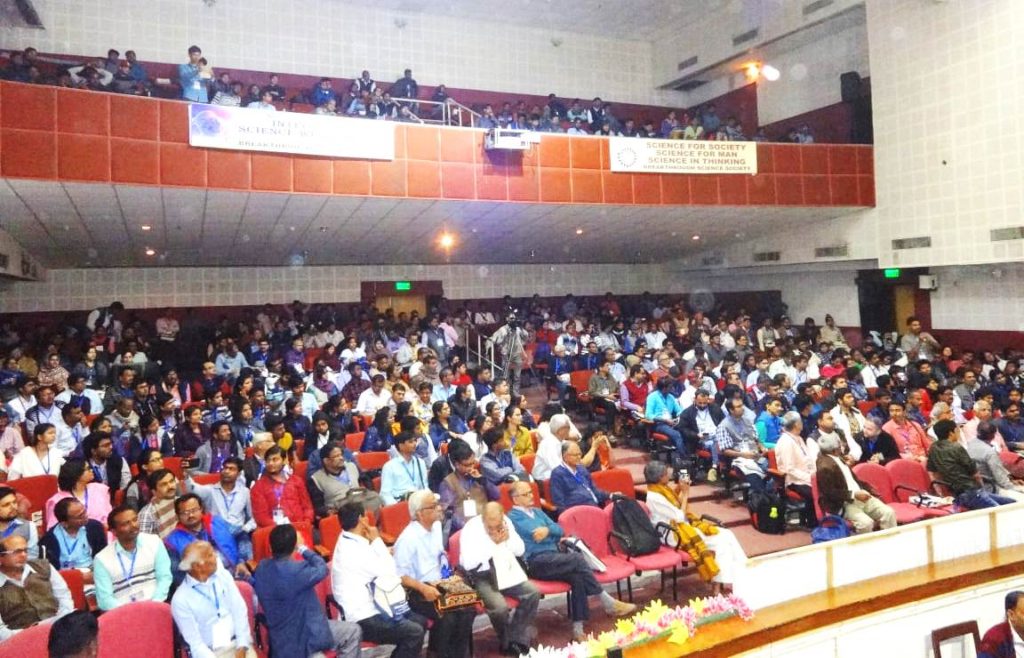
There is a charge that reason based or evidence based thinking is of western import. But that is not true; reason based tradition was there with the Arabs and so also in the Indian subcontinent. Prof Dane quoted from the 10th century Arab thinker Al-Haytham renowned for his works on optics, “The duty of man …. .if learning the truth is his goal is to make himself an enemy of all that he reads and attack it from every side. He should also suspect himself as he performs his critical examination of it so that he may avoid falling into either prejudice or leniency.” In India also substantial reason based philosophic traditions were there. The Mimamsa works of Sabara, Prabakara etc.; the Lokayata or Charvaka tradition; Samkya, Vaiseshika, Yogavasishtha etc.; the Buddhist tradition, were some of those. Kanada was an outstanding rationalist thinker.
Knowledge acquisition has two main components, inputs through sense perceptions coupled with experimentation and inference. In the 19th century excessive importance was given to the sense perception,the use of inference in conceiving reality was viewed with hostility. This trend gave birth to positivism or empirio – criticism. Under its impact most physicists did not accept anything that was not observable by the senses. Boltzmann was one of the major victims of this trend since his kinetic theory of gases required the presence of molecules which were not visible. Apart from senses we have the innate facility of arriving at inference through deductive and inductive reasoning. In the 20th century positivism was overcome mainly through the efforts of scientists like Einstein and scientific materialism got established. Through his work on the theory of viscosity, Einstein deduced that molecules are a physical reality. His work on Brownian motion further established the reality of molecules. His work on photoelectric effect showed the reality of the quanta of energy formulated by Max Plank.
Inference is also vulnerable to various corrupting factors. In parallel with our sensory abilities we have emotions, love/hate, pride, hostility, revulsion etc. At a collective level there are various vested interests like business interest, political interest, professional interest etc. favoring one or the other idea. One needs to counter these influences consciously for the effective use of inference in the process of acquisition of knowledge. In this context he referred to some of the pseudo-science claims in recent times like the medicinal effects of Gomutra and others that have been making headlines in the media. There are also other claims appearing in the media and social media. It is necessary to subject such claims to the scrutiny of scientific examination and verification, he said.
Prof Nagarjuna, Professor, TIFR – Homi Bhabha Centre for Science Education, Mumbai
‘Making as a Medium of Truth:A Constructionist View of STEM’
Prof Nagarjuna congratulated BSS for organizing the conference at Kolkata where the Indian Association for Cultivation of Science a pioneering institution for the advancement of science had sown the seeds of the science movement in the country more than a century back. He enunciated the concept of constructionism in the field of epistemology and philosophy. On the question why STEM (Science, Technology, Engineering, Mathematics), he said that this will provide an organic view point. Technology has been neglected in the study of philosophy of science. But technology has a big role in establishing falsifiability. Explaining with the help of building blocks such as atoms, numbers, elementary particles, cells, genes etc. he demonstrated the constructionist approach in developing theoretical understanding in various branches of science.
DrLiaquat Ali, Honorary Director, Pothikrit Centre for Health Studies and former Vice Chancellor, Bangladesh University of Health Sciences
‘The Bengal Renaissance: an Epistemological Analysis’
He presented a brief history of the renaissance in India, particularly the Bengal renaissance led by stalwarts like Raja Rammohan Roy and Vidyasagar. He also spoke about the empiricist streams of thought in both eastern and western philosophies. He said that Ancient India had a rich tradition of empiricist philosophical thinkers whose contributions have not been properly understood or have been twisted in our history of thought. He cited the examples of the empirical elements in Vedas, the empiricist ideas in Charvak and Vaisheshik-Nyaya philosophies, and the pragmatist worldly approach of Buddhist philosophy. He concluded by discussing about the limitations of Bengali Renaissance and said that the present generation has the responsibility to pursue the unfinished tasks of Bengal Renaissance taking into consideration the experiences so far generated in the modern world.
Session 2: Cultivation of Scientific Temper
This session was chaired by Prof. Abhijit Majumder, Dept. of Chemical Engineering, IIT Bombay.
Dr Ajit M. Srivastava, Institute of Physics, Bhubaneswar
‘Cultivation of Scientific Temper: Focus on Indian Science Community’
In a lucid talk laced with humor he discussed ways of inculcating scientific bent of mind among the commonpeople, and more particularly among the people who are “trained in science”. He was of the opinion that on the question of scientific temper there is not much of a difference between the common people who are not “trained in science” and the people supposedly “trained in science” , e.g., those who have Ph.D. in science. The difference completely disappears when one focuses on scientific analysis ofsocio-economic phenomena.
The main reason for this situation, he attributed to the intensely feudal family structure in our society where questioning is suppressed in general in all aspectsof life and the same atmosphere continues in schools and colleges.He felt that we can attempt to improve the situation, though in limited ways, for example, by imparting anearly training to children from schools about the importance of unconstrained questioning. For this he suggestedorganizing regular intense and completely informal discussion sessions of scientists with school students wherescientists do not appear as authorities of knowledge, rather facilitators of discussions on various topics.
Prof PalashBaran Pal, Popular science writer and former Professor, Saha Institute of Nuclear Physics
‘Scientific Temper and the Education System’
Our education particularly at the school level does not teach the learners to think rationally and to act logically.The school syllabus is too heavy that leavesvery little time for the students to think. He discussed on the ways rational and logical thought can be encouraged through education. He suggested the following points in this regard.
1. The importance of teaching in the mother tongue, which helps develop a student’s imagination.
2. The importance of learning the science behind phenomena seen in everyday life, and a quantitative study of global environmental issues.
3. The importance of reading popular science books which tell students not only about the theories, but also how the ideas were conceived.
Prof Mangala Narlikar, Former Professor of Mathematics, University of Bombay and University of Pune
‘Developing Scientific Temper’
The most important aspect in cultivating scientific temper is to develop in students a questioning mind in schools. There are many facets of the question of developing scientific temper in our society. Is scientific temper against religion? Does scientific temper exclude belief in God?On this she said that scientific temper does not insist that you should not believe in god. There are two types of believers, reasonable believers who are open to reasonable logic and fanatic believers who are victims of superstitions and other unreasonable practices. What scientific temper is against is in holding as true what has already been proved to be false for example rahu, ketu etc. and other superstitious beliefs. The important thing is to ask questions and try to find rational answers. The task before us is to complete the unfinished renaissance of the whole country and to take science to the people patiently and tactfully.
Prof AniketSule, TIFR-Homi Bhabha Centre for Science Education, Mumbai
‘What do we learn from our recentbrush-ins’
In the recent past, the scientific community had to raise voice repeatedly against suppression ofscientific thought in the country. In this context he felt that it was more appropriate to discuss about the events in the last 18 months. One of the important events was the March for Science organized in August 2017 and April 2018.Then in January 2018, a signature campaign was launched to protect evolutionarytheories in school curriculum. Similarly, a couple of months back we had to raise our voice again on the issue ofproposed inclusion of a book of poor quality in model curricula of technical education. In his talk he mainly discussed about the lessons learnt from these brush-ins so as to prepare ourselves in a better way in the future. From the feedbacks received from the scientific community and media people, he felt that when we prepare a write up explaining our stand on an issue we should make it very clear, focused and brief. The reason is that when press people go through the material to prepare a report they would not prefer a lengthy draft. The order of the demands also matter. In our write up on the March for Science the first demand was on funding and so the press mainly highlighted this demand. There was some criticism from some scientists that we have come not just for money alone. Another important observation he made was that more participation from senior scientists, women and students is needed. The nonpartisan way of writing the draft was appreciated by the scientific community as well as the media people. He also felt the need for a strong presence in the social media.
Session 3: ‘Ethical Practice in Science’
The session was chaired by Prof Naba Kumar Mandal, former Professor, TIFR.
Prof Dipankar Chatterjee, former President, Indian Academy of Sciences and Honorary Professor, IISc, Bangalore
‘Galileo’s Children’
Scientific temper and ethics is closely related, without ethics it is not possible to cultivate scientific temper. The challengesand many failures that a scientist has to encounter are strongtemptations to take shorter routes to achieve success. Thus,an experimenter can generate desired results by massagingthe raw data and bending the truth. However, such resultshave short lives. The inherent strength of science isreproducibility.Observations and conclusions which are rigorously tested andreproduced by others alone get written on granite stone. A research student faces such temptations from the very beginning of his/hercareer. Term papers, even lab note books, for example, areindeed well tested exercises in original thinking and writing.However, today’s copy-pastetechnology offers such alluringshort cuts that ultimately lead to plagiarism in scientific paperwriting. It may be possible to survive by bending the truth,where success is judged by some bizarre metrics and not bythe rigor behind the scientific output of an individual. He concluded by saying that whatwe urgently need is a self-correcting mechanism in place.
Dr C Prabhakara Reddy, Professor of Cardio-Thoracic and Vascular Surgery, Govt Medical College, Kurnool, Andhra Pradesh
‘When will the fruits of medical research reach the common man in the present scenario of violatedmedical ethics?’
Physicians are also part of the society and the ills of the society also influence them. A person who wants to become a doctor should be judged by his passion for the profession, but unfortunately our system selects medical students by entrance tests without judging his commitment to service. And because of the commercialization of the medical education system,the commitment for service to the society has vanished. Even Governments are collecting huge amounts to start hospitals and are promoting corporate culture. Hospital is declared as an industry, and patient is considered as consumer. This has caused a lot of damage to the society. Medical profession has become a business and we are now facing its evil effects.
Manufacturing and pharmaceutical sectors are involved in similar business. Drugs fetching larger profit margins are marketed where as essential drugs are not produced in adequate quantities. The issue of patent is another problem affecting the health sector. Companies who own patent for some drugs are selling those drugs at abnormal prices unaffordable by common people.
There is a huge gap between what people need and whatthe governments are providing in the healthcare sector. Primary Health care system isnot at all strengthened. Secondary and Tertiary level hospitalsystem is inadequate. In primary hospitals thenumber of doctors is insufficient and infrastructure andpreventive measures are not addressed. As a result, peopleare forced to go to corporate hospitals. Theknowledge of diseases and medicines has become a commodityand is being sold with huge margins.We have to change this situation; everybody shouldget the fruits of research, science and technology. The Dream ofhealth for all will be achieved when medicines and treatmentare available to all rather thanthose who can afford.He also spoke about a very inspirational work he has undertaken in setting up a model cardio-thoracic Centre in a government medical college hospital in Kurnool where state of art heart surgeries are conducted free of cost. In the last two years 300 heart surgeries were conducted in the Centre.
Soumitro Banerjee, Professor, IISER Kolkata
‘A few issues in the ethics of science’
Ethics are systematic norms of behavior that are conducive to the aims, objectives, and activities of a community, profession or organization. In the conduct of science, the practices conducive to collective enquiry into natural phenomena that have developed through ages constitute ethical practices in science. This includes the issues of objectivity and carefulness in planning and conducting experiments; honesty and integrity in reporting the results even when these contradict one’s own beliefs; openness in disseminating the research results, etc.
Even though most of these practices that constitute ethics of science seem to be obvious, violation of these is becoming increasingly common. One main reason for this is that in our country science is considered as a carrier just as any other carrier. Many scientists no longer investigate nature for the excitement of it; they do it to fulfill well-defined career goals – promotions, awards, name and fame. Intense competition and the urge for quick results have opened the doors for various malpractices including fabrication, distortion, plagiarism, and various types of unethical publishing practices. He cited some of the classic cases of fraud such as the Piltdown man, the Japanese stem cell research, the Korean cloning experiment etc. He also talked about the role of motivated research funded by interest groups, the role of Intellectual property rights etc. in vitiating research ethics.
Play: ‘The Uncertainty of Principles’
In the evening, a humorous play titled ‘The Uncertainty of Principles’ was staged by a group of professional scientists.The play was about an educated, middle class family which gets steeped in superstition and into the clutches of a ‘Godman’ due to a very tragic event in their lives. One of the two sons, who is a physicist and a passionate teacher of quantum physics and who shuns unscientific thinking and practices, counsels his family members and helps them to come out of their irrational shell. The play tries to give the message that uncertainties in life often makes people slip into irrational practices.
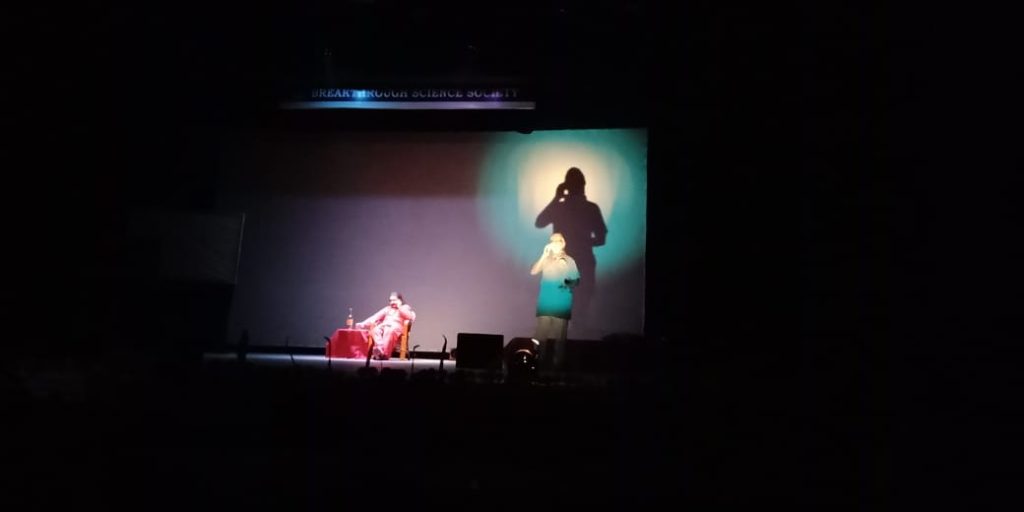
Session 4: Reforming Science Education
The session was chaired by Prof. Narayan Banerjee, Professor, IISER Kolkata.
Prof M C Arunan, CUBE Lab, Homi Bhabha Center for Science Education, TIFR, Mumbai
‘Populating India with STEM Spectators: GullyCricket Model of Spreading STEM Culture’
In India, there is a serious dearth of spectators for Science, unlike, say, in a game of cricket. A game like Cricket is a rule-following activity where the players as well as the spectators are immersed in it. The idea was to see if Indian science can learn anything from Indian street cricket. With this aim a new model of STEM (Science, Technology, Engineering and Mathematics) education called CUBE (Collaboratively Understanding Biology Education) was launched 6 years ago at the Homi Bhabha Center. STEM is taken as a set of games scientists, engineers and mathematicians play. The idea is to develop groups of people who understood some rules of the game and they would constitute the STEM spectators. For creating the STEM spectators, groups of students and teachers working in collaboration were encouraged to do experiments using the resourcesin their neighborhood on problems that they observe in their everyday life. Several such groups in under graduate colleges and schools across the country were set up. Prof Arunan narrated examples of such experiments as the pea study, the Dafnia study, the flowering patterns of mangoes in different geographical locations etc. It was observed that some of these studies matured from curiosity to frontier sciences.
Prof Umesh Kadhane, Indian Institute of Space Science and Technology, Thiruvananthapuram
‘Reforms in science education: conflict between deliverable and assessment’
In an environment where quantitative assessment is at the highest priority, the teaching goals and deliverable get distorted. One of the reasons why our science education is in the present dire situation is the method of assessment of the students on the basis of their marks. This forces the system to teach concepts in terms of packets which can be asked as answers to students in examination and marks can be given.More rationalistic, objective and scientific teaching must focus more on the concept rather than definitions and derivations. A more modern but practical approach is needed urgently. He suggested that if courses are designed with more emphasis on hands on learning and experimentation, then transfer of concept and assessment both can be achieved with better efficiency.
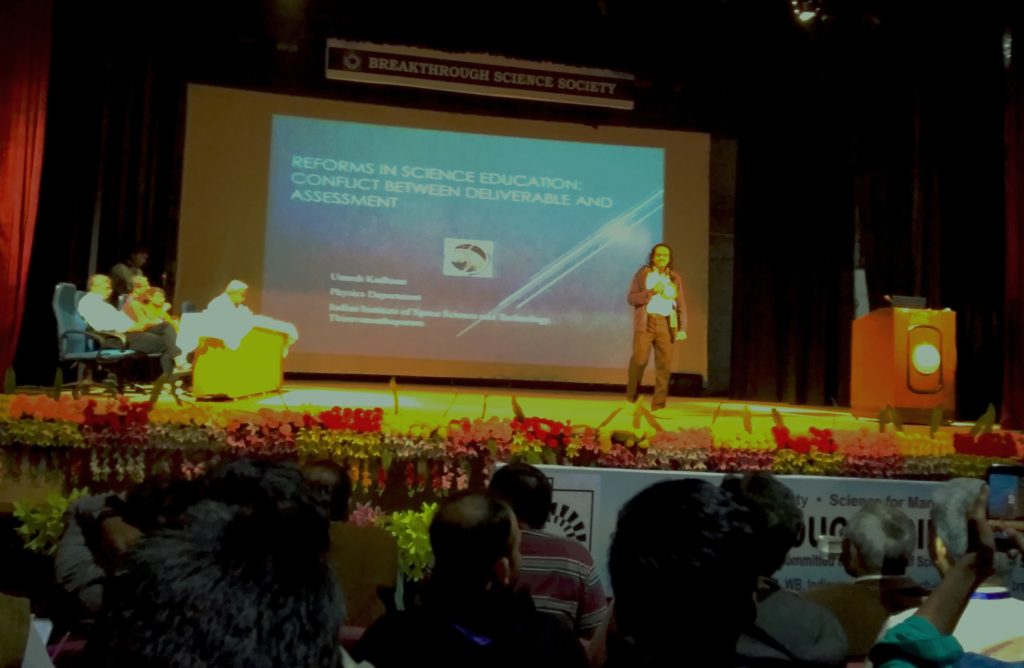
Prof MayankVahia, Dean, School of Mathematical Sciences, Narsee Monjee Institute of Management Studies, Mumbai, & TIFR
‘Teaching Science to Non-science Students’
We aretalking about science, but we never teach science to the students. We only teach the grammar of science. Is it possible to teach English language only through Wren & Martin without bothering about who is Shakespeare or what he wrote? Talking about physics education, he said that the students need to understand its logical elegance as one appreciates a good poem. That physics can be taught onlythrough equations is counterproductive. Understanding the concept is more important. After a concept is understood, mathematics is necessary to generalize it. Taking the example of the pendulum, if the student is told that the pendulum obeys such and such equation it makes no sense for the student. First the student has to understand why it oscillates before going into the equation that it obeys. In the text book Newton’s law is stated as that a body continues in its state of rest or of uniform motion unless it is acted upon by an external force. But every child has the experience that a ball rolling stops after some distance. So there is a contradiction between the physics taught in the classroom and the physics experienced by the student.We need to make the student understand that Newton’s law is correct. It is friction, something not known earlier to the student which makes the difference from what is seen in the textbook and what he or she actually experiences. Summarizing, he said that most of us are visual people and visualization is very important in the learning process. Getting science studentsto understand the complexities of real situations is another aspect. In our country the number of students in the non-science stream is much more than in the science stream. It is necessary to make the non-science students understand the beauty of the logical simplicity of science and that would make science versatile.
Prof R Ramanujam, Institute of Mathematical Sciences, Chennai
‘Doing science in the science classroom’
The central problems of our science education are little experimentation, little critical thinking, inadequate emphasis on modeling and quantification and little relation to technology. Apart from these, there are generic problems in education that afflict science education as well: excessive rote learning, inadequate teacher preparation and rigid modes of assessment and evaluation. All of these together end up privileging memory-based theoretical knowledge.
The most critical problem is the entire lack of hands-on engagement in scientific activity by children in school. On the one hand, this encourages children to perceive science only as a collection of (disjointed) facts, and experiments as demonstrations of already established facts. On the other hand, this also helps perpetuate social inequality, by respect for intellect and degradation of physical work.
Prof Ramanujam strongly recommended the need for reforms along the following lines:
Shifting the focus of the science classroom from content knowledge towards critical scientific inquiry; Active engagement of all children in experimentation and working with physical material; using material to make /build things; Making connections between the areas of science as well as with other areas of study; Changing assessment models to reflect the methodology of science; Enriching teachers with a variety of scientific resources.
Doing science in the classroom implies a commitment to the process of science; it is also the way to build scientific temper in society.
The Session 5: Panel Discussion “The role of scientists in society”
The session was chaired by Prof Amitava Datta, INSA Senior Scientist, Dept of Physics, Calcutta University. The panelists were Dr C M Nautiyal, Prof Pradipta Bandyopadhyaya, Prof Prajval Shastri, and Prof Guruprasad Kar.
DrC. M. Nautiyal, Formerly Scientist-in-Charge, Radiocarbon Lab., BSIP, Lucknow.
Now with Indian National Science Academy, New Delhi as Program Consultant (Science Communication)
‘Scientists as Integral Part of Society’
In olden days the popular term for those studying nature was ‘philosopher’. We should think about the role of scientists in society in that light again.Usually scientists are viewed as thinkers who work in isolation, but if that were true not so many of the discoveries and inventions beneficial to mankind would have taken place. Those discoveries were the result of curiosity as well as the compassionate side of human mind. These humane traits have greatly benefited the society. So the role of scientist in society has also been of one who serves humanity.
He felt that if scientists visit teaching institutions and teachers spend some time in research institutes, it will greatly help to improve theeducation system.Scientists should also take time to interact with farmers and other strata of people. Through such interactions many problems in the farming and rural sector could be resolved. Scientists also have a big role in educating the masses about the natural phenomena and to free people from misconceptions and superstitions. He cited the remarkable example of the total solar eclipse in 1995, when scientists organized several outreach programs. In Diamond harbor, Kolkata, more than 600 children had come the previous night, listened to the discussions on eclipse and witnessed the eclipse the next day.
Prof Pradipta Bandyopadhyay, School of Computational and Integrative Sciences, Jawaharlal Nehru University, New Delhi
‘The role of scientists in society’
In India there is not much of a connect of science and scientists with society. The role of scientists in society has changedconsiderably over the last century. It is known that in the earlyand mid-twentieth century, a large number of scientists havebeen involved in shaping the thought process in society both inIndia and abroad. In India both before and after independence,several scientists played significant roles in shaping the future of the country. For instance, Prof P C Mahalanobis was a member of the planning commission, and Prof M N Saha was a member ofparliament.However, it appears that there has been a steady decline of scientistswho are strongly connected with society. One major reason forthis could be because of the complete separation of humanities andscience streams from an early stage of our education, say plus one level. Hence, one can practice sciencewithout knowing basic history, geography, political science etc. There could be other reasons like scientists are generally recognized by their academic works, papers etc. rather than their commitment to society.
Dr Prajval Shastri, Indian Institute of Astrophysics, Bangalore
Beyond Bridging the Science Deficit: Scientists Role inTransiting to Public Ownership of Science
In India today we are witnessing a deep disconnectbetween the public readily embracing the fruits of technology onthe one hand but being skeptical of the scientific way ofunderstanding the world around us on the other.It is also true that common people have been exploited by superstitious beliefs. Prof Prajval listed several reasons for the science deficit. The lack of science communication among the larger public is one important aspect. The hiring and promotion process in scientific institutions is weighed in favor of performance culture with very little importance for teaching and outreach activities and no innate commitment to the scientific method. In research institutions, open discussions on philosophical questions such as what are the implications of the scientific method are quite a bit stifled so much so that the practicing scientists and definitely the public forget that thescientific method is the best way to understand the world around us. Issues of scientific method are often seen as direct opposition to religion. The task of persuading the public including the professional scientists to accept the scientific method has not been carried out by the practicing scientists, but mainly by voluntary science organisations. She said that lack of funding is not a major reason for thedisconnect. Freedom of expression for the academia, freedom to conduct open debates etc. should be constitutional right so that use of service rules to suppress dissent becomes illegal. The scientists should be concerned less about entitlements and more about responsibilities and move towards public ownership of science.
Prof. Guruprasad Kar, Indian Statistical Institute, Kolkata
‘Correlation between present model of development andthe propaganda of anti-science’
In the last few years there had been a misinformationcampaign regarding science and ancient history of India. Theproblem has been acute not just because some fringe groups areinvolved but some people occupying governmental position havealso taken special initiative in this direction. It is to be noted that this misinformation campaign has intensified with theintensification of various neo-liberal economic policies. The neo-liberal globalization policy has been in vogue for morethan two decades and it has created a few super rich at the cost of enormous misery for the common people. With the backing of clear statistics, Prof Kar showed the effect of globalization on various sectors. Agriculture is one of the most badly affected sector, more than 2 lakh farmers committed suicide in the last 20 years. In the mine rich states like Chattisgarh, Jharkhand etc. the percentage of people belowpoverty line has gone up drastically. People’s discontent has been rising fast all over the country. In such a situationthe pseudo-science propaganda is one of the tactics adopted by the ruling elitesto create confusion among people so that their thinking and reasoning ability is impaired. In this context, scientistswhile exposing the non-scientific propaganda and abuseof science should also challenge the various policiesadopted by the government that go against the interest of thecommon people.
Open session on Dec 16, 2018
The concluding session of the conference was an Open Session (for the public) at the Open air theatre of Jadavpur University. Prof Dhruba Mukhopadhyay, President, Breakthrough Science Society, presided. Prof Pradip Narayan Ghosh, Pro V C, Jadavpur University, addressing the large gathering of delegates, students and general public talked about the necessity of integrating science and technology for the benefit of the society.
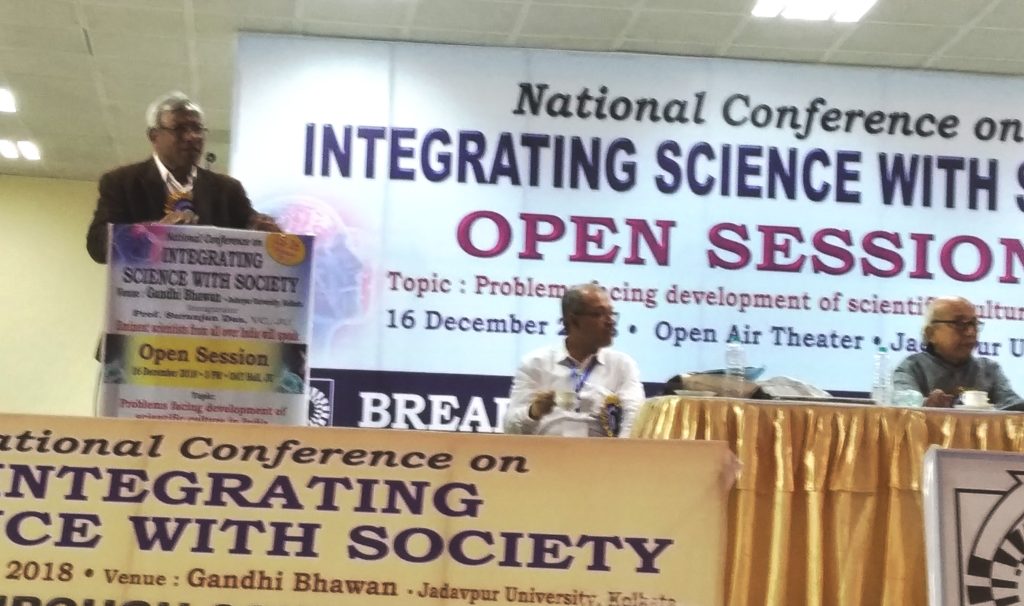
The main speaker was the eminent astrophysicist Prof Jayant Narlikar. He spoke on the problems facing the development of scientificculture in India. He began his speech with his deep concern about the mindset of a large section of our people. Even though we live in the 21st century and are enjoying the advantages of many technological developments of science, the mindset of a large population of our country is frozen in the 19th century.Laced with humor he cited examples of different types of superstitions prevalent in our country. Several years back, the so called miracle of an idol drinking milk had become sensational news in the country. But then the real miracle was that the news spread so fast -a miracle of modern technology.
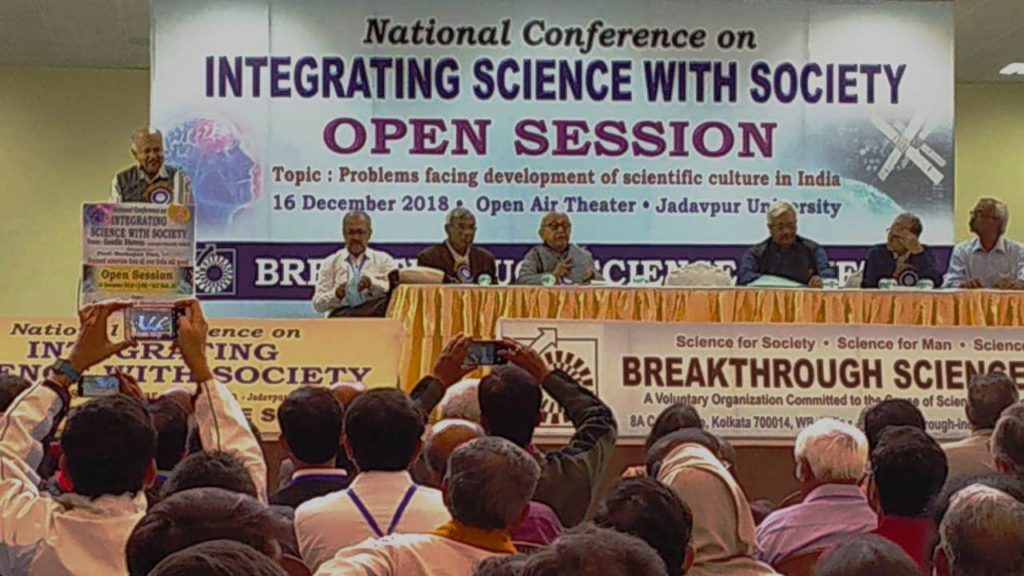
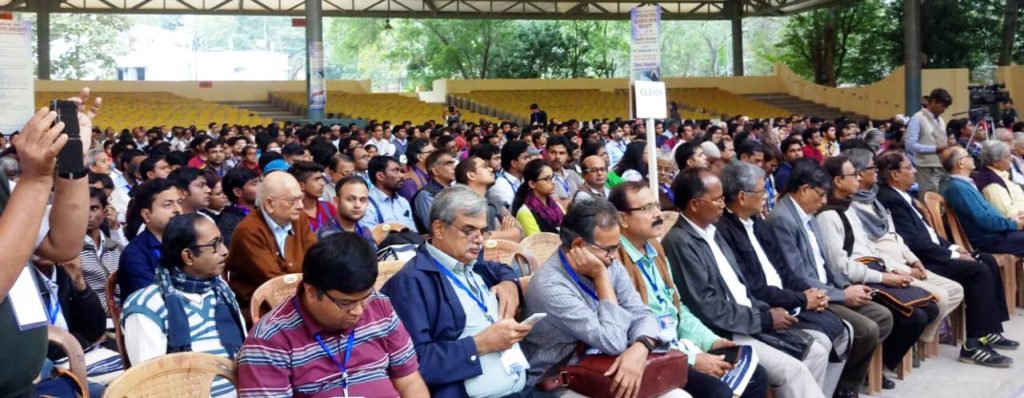
He suggested that one method that may be of use in controlling the spread of superstitions is to develop suitable tests to check whether the predictions of these superstitions are correct. He cited the example of the experiment conducted by Bernie Silverman in the USA to see if there was any correlation between happily married couples and their birth charts. A similar experiment was conducted in Maharashtra where the birth charts of 200 students, out of which 100 were that of bright students and 100 were of mentally retarded students, were taken for the study. 40 charts were randomly picked and given to 51 astrologers and were asked to pick the bright students among those. The results showed a success rate marginally lower than that would be got by coin tossing.
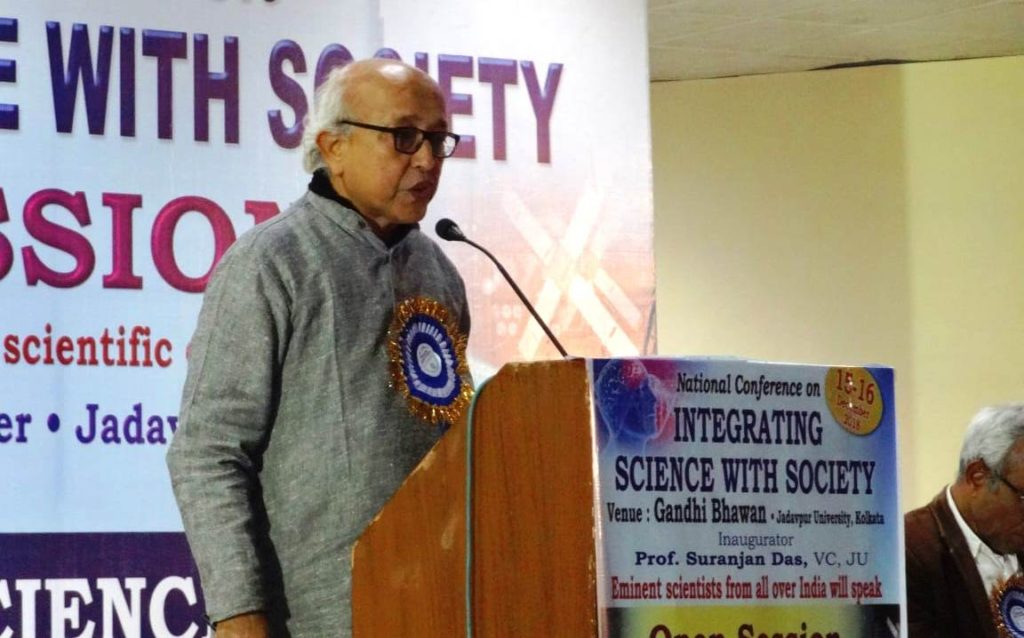
Narrating interesting stories and anecdotes he explained the need to develop scientific temper in the society.But we must learn to be patient and tactful rather than aggressive or abrasive in tackling superstitions, he cautioned.
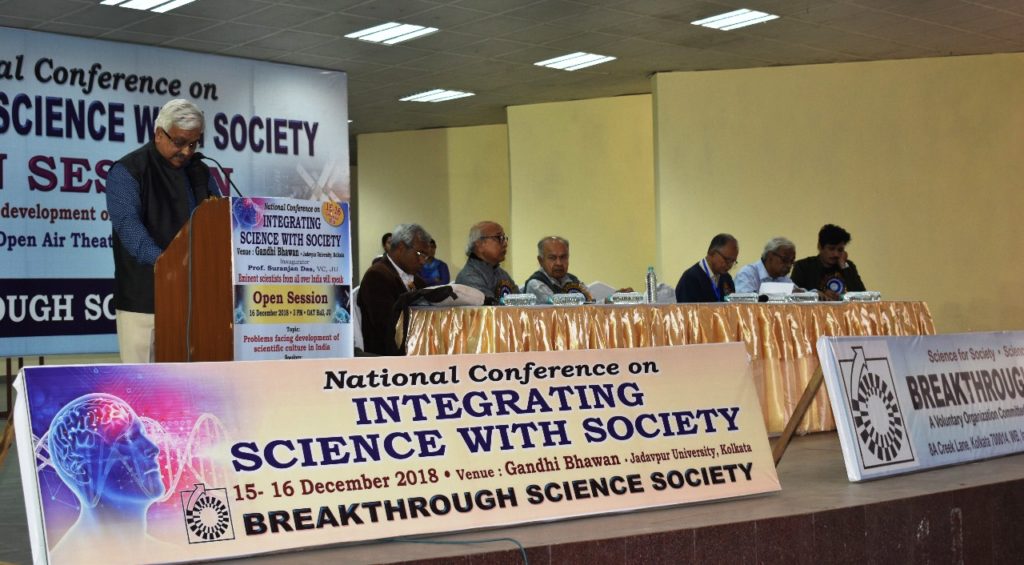
The chairpersons of different sessions of the conference presented brief summaries of each session. The conference ended with an emotional call by Prof Soumitro Banerjee, General Secretary, Breakthrough Science Society to take up earnestly the task to make India scientifically literate. He also thanked the speakers and the delegates.
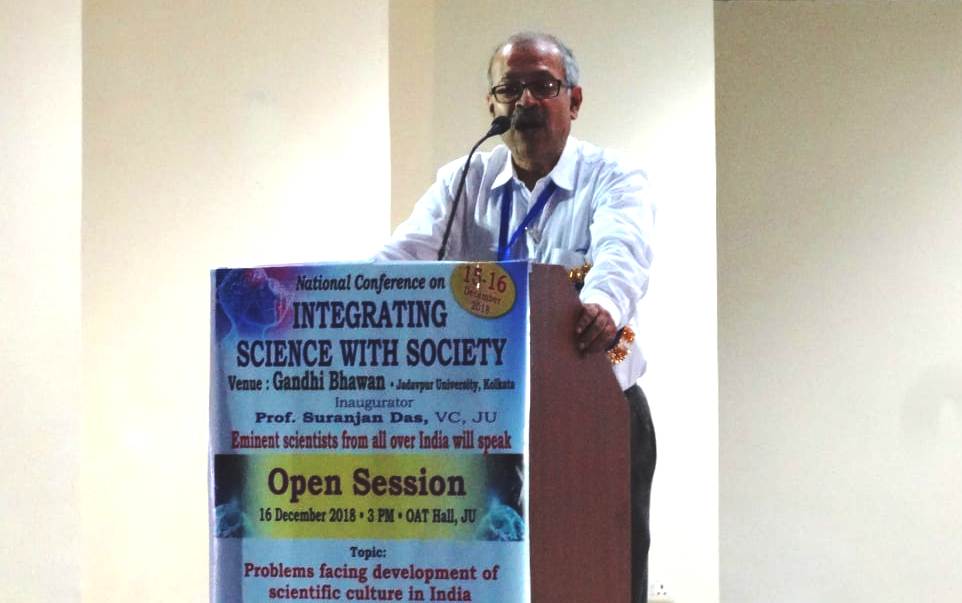
Messages
Debabrata Ghosh, Department of Physiology, All India Institute of Medical Sciences, Delhi
Dear Chairperson, Organizers and Delegates,
We live at a time when there are state-sponsored attemptstowards the viciously privative employment of abstractconstructs and characters, and the planned plantation of misplaced concreteness. These are some of the original sinsof the rationalistic mind. However, I find a ray of hope in theantithesis brought forward in this Conference by the Organizersof Breakthrough Science Society to draw upon a few rationalminds to ponder upon different facets of philosophy and historyof science and to open up dialogue to integrating science withsociety. In the Conference, I had a task to present a paper on,“A scientist’s view on the tenets of politicization of science”highlighting some of the principles and processes underlyingthe politicization of science.I thank the Organizers and special thanks to Professor Soumitro Banerjee, the Horse Power of the effort. No doubt the effortis commendable, but true hope is due to the delegates as theywill henceforth be delegated to carry the rational spirit intolarger societal canvas. Please recall what was opined in Katha-Upanishad, “Wonderful is he who can teach…and Wise is hewho can be taught”. Please note that there is no binaries, it isthe process philosophy.Personally, I wished to witness this process, but it cannot befructified now due to some personal issues. It is my loss and I apologise for this last moment change from my end andconsequent inconveniences. I wish a grand success to the organizers of the Conference and that it triggers the outreachspread of progressive rational scientific spirit.
DrJayasree Sengupta
Chair of the Board of General Assembly-International Union of
Physiological Sciences, Former Professor and Head, Physiology,
All India Institute of Medical Sciences, New Delhi
In the play NathbatiAnathbat, Shaoli Mitra portraying Draupadi, daughter of the Panchala Raja, Draupad, wife of the five Pandava brothers cries out in the court of King Dhritarashtra being called ‘unchaste’ by Karna when Yudhishthira loses her in a game of dice in Mahâbhâratam ~400 BCE. Now in the 21st century #Me Too Movement we find women still remain the subject of racial and gender inequity.In my article, ‘Oral contraception: Science, ethics and policies’slated for discussion at the national conference in Kolkata, I have attempted to highlight how a group of scientists, medicalfraternity and the industry misused their powers to delusionwomen to believing that use of oral contraception promisedgreater control over their bodies and fertility, failing to informthat this “freedom” comes at an enormous cost to a woman’shealth. Despite several generations of women having been usedas guinea pigs, as more and more dangers of the birth controlpills are still emerging we do not find its echo in the Indianscenario as found in the western world through blogs and groupmeetings. As a society we in India must focus upon such moraland ethical issues, and policy controversies on how sciencefailed the ethics from the viewpoint of women’s welfare toenlighten the public through conferences such as the currentone, Integrating Science with Society and through Outreach Programmes. Unfortunately due to certain commitments I amunable to join this meeting in person but I take this opportunityto wish the conference all success.
Prof Ram Ramaswamy
President, Indian Academy of Sciences, former VC, Central University Hyderabad and Professor, IIT Delhi
Hands-on learning at an early stage
The main reform that is needed in science education in thecountry should be in our schools. Much of our education at theprimary and secondary level at the present time relies on rotelearning, with the classroom teaching mainly being ‘one-way’.From an early age, students are encouraged to not askquestions, and the examination processrewards those who arebest able to reproduce what has been delivered in the textbooksor in the classroom. Thus in most of our schools today, there islittle scope for students to learn by doing, and in all but themore elite institutions, classroom or laboratory science experiments are not a part of the curriculum. Whatever islearned at an early stage is largely delivered wisdom.If the scientific temper is to be imbibed at all, it has to be at thisstage, and the necessity is for strengthening primary education.There is an urgent need to focus on learning skills. The futurewill increasingly belong to those who can teach themselveswhat they need; and the earlier that students learn how to learn,the more they will be able to apply these skills at a later stage.Intrinsic to the scientific temper is the ability to question, andwithout the freedom to question, this ability is rarely developed. There have been many attempts to reform the primaryeducational system, and some of these have been in thisdirection. Mahatma Gandhi, who believed that one should “learnas if you will live forever”, proposed the alternate schooling method, Nai Taleem. This places special emphasis on skilldevelopment and has apprenticeship as an integral component. Although Gandhiji’s experiment is largely forgotten at thepresent time, there is an important aspect that is easy to redeem:there needs to be more hands-on experience at the primaryand secondary levels: Our schools should be laboratories oflearning, and this is an investment that will pay for itself manytimes over.



